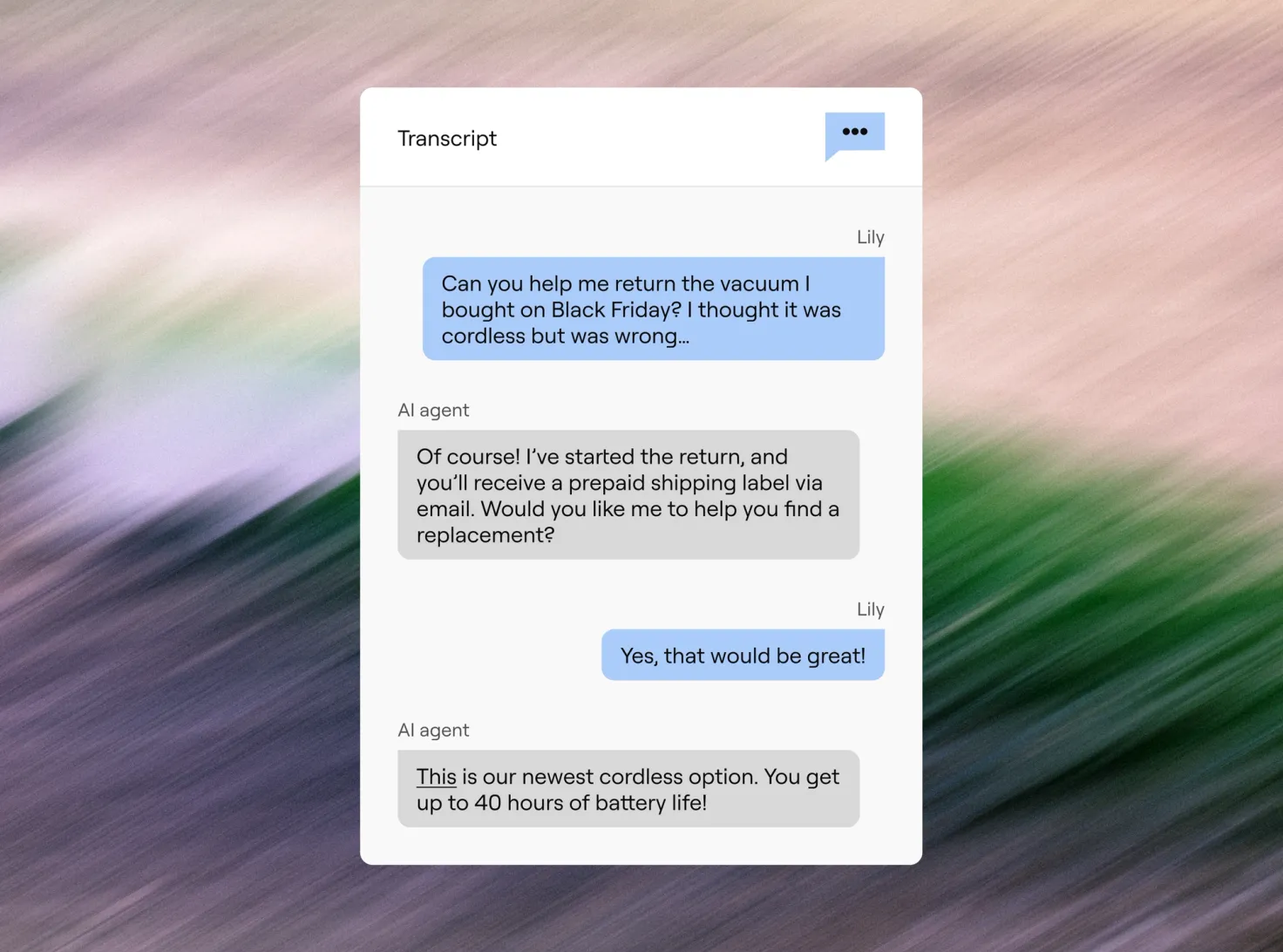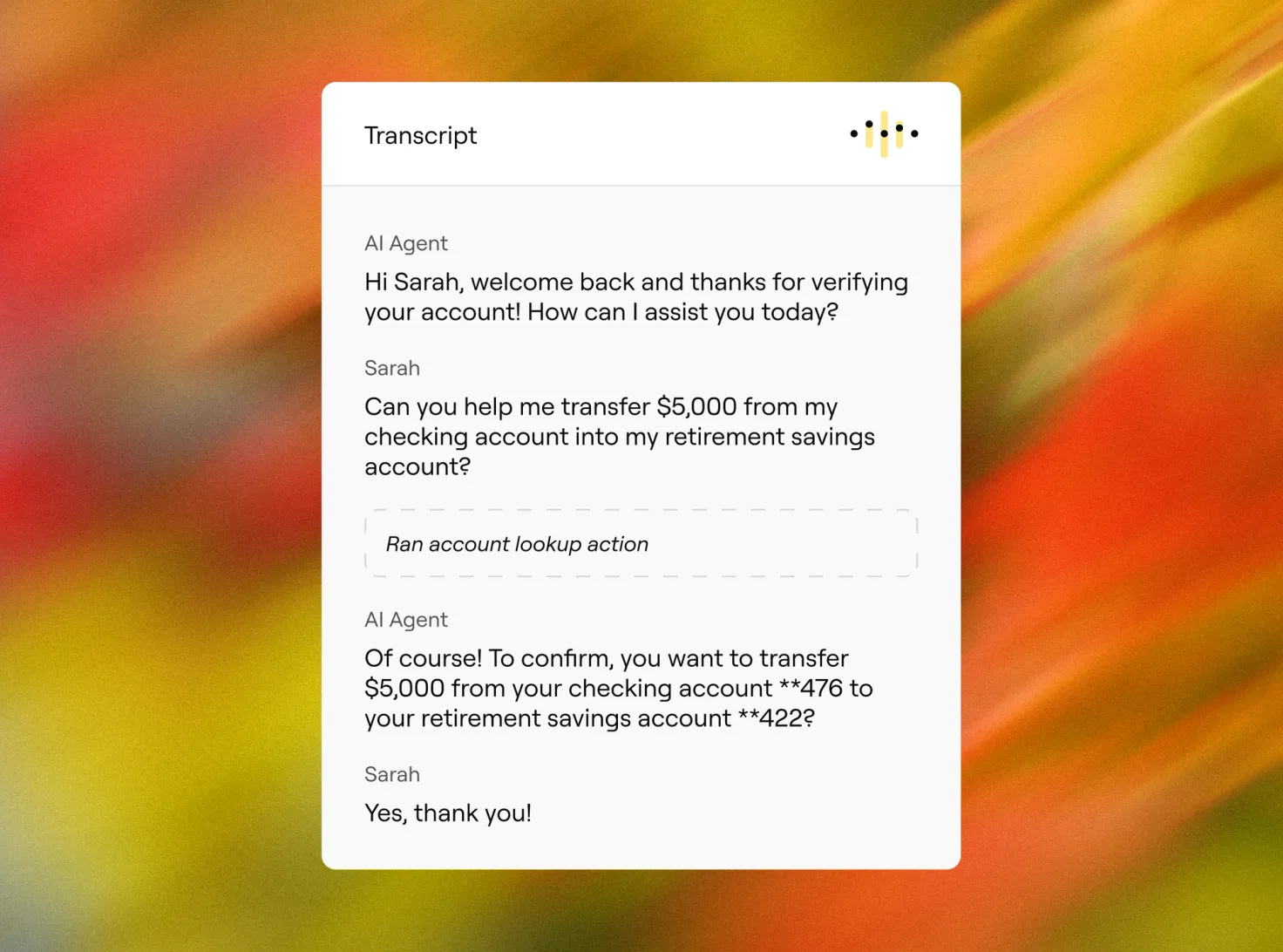
Assessment: Is your enterprise ready for AI customer service?
Before choosing the right AI customer service solution for enterprise scale, use this assessment to make sure your organization is set up for long-term success.
Learn More

Integrating AI into your customer experience doesn’t stop at deploying an AI agent on your website.
As customer expectations rise, support teams are being asked to deliver more with fewer resources. AI offers real promise here, but without access to integration to critical systems , even the smartest AI agent is operating in the dark.
If your AI agent can’t pull data from your CRM, it can’t recognize returning customers, personalize interactions, or take meaningful action. That’s why AI CRM integration isn’t optional, it’s foundational.
Your CRM isn’t just a database, it’s the connective tissue between your customer and your brand. When your customer service AI is integrated with your CRM, support shifts from reactive to proactive, from generic to personal. It’s the difference between AI that guesses and AI that resolves.
Let’s break down what CRM integration with AI actually enables, and why it’s the key to improving customer satisfaction, reducing costs, and finally seeing the ROI you were promised.
When AI can’t access your CRM, every conversation starts from zero.
Imagine a customer who’s made three recent returns. They open a chat with your AI agent, clearly frustrated. If your systems are integrated, the AI can see that pattern and proactively respond: “Hey Alex, looks like your last few orders didn’t hit the mark. Want help finding a better fit?”
If not? “Hi! How can I help you today?” No context. No empathy. No resolution.
Without CRM integration, your AI agent lacks the context needed to resolve issues. It becomes a glorified contact form—one that can’t recall past purchases, loyalty status, billing issues, or account preferences.
That disconnect leads to longer resolution times, higher escalation rates, and a CX that feels robotic for all the wrong reasons.
A lot of businesses think they’ve integrated AI because they’ve added a basic chatbot to their website. But without access to your CRM and other key systems, that chatbot is just guessing—and escalating back to your human agents.
The real value of AI-powered CRM support comes when your AI agent can actually do things, like:
All of that requires two-way communication with your CRM. In fact, many of the most common (and high-volume) inquiries like “where’s my order?” or “can I change my billing info?” are only resolvable with CRM access.
AI CRM integration transforms your agent from a support triage tool into a true resolution engine. When connected to your CRM, an AI agent doesn’t just answer questions—it understands the customer’s full story and can act on it in real time.
And because CRM data is often central to most customer inquiries, this one integration can unlock resolution for a wide variety of intents, from shipping and returns to billing and loyalty.

Integrating your CRM with AI isn’t just a technical upgrade, it’s a strategic one. It changes the role your AI agent plays from reactive to results-driven.
When your AI can access CRM data in real time and take action directly within those systems, you move beyond deflection and containment. You start resolving. And that shift leads to better outcomes across the board. Not just for customers, but for the business.
Here’s what you can expect when AI and CRM systems work as one:
These aren’t just nice-to-haves. They’re the difference between an automation strategy that scales and one that stalls out. But reaching this level of performance requires more than plugging your AI agent into a CRM. It requires choosing a solution that was built for this kind of work .
It’s one thing to say your AI agent connects with your CRM. It’s another to see that integration delivers real, repeatable outcomes .
Plenty of tools claim CRM compatibility, but what you need is true interoperability. That means your AI agent doesn’t just see CRM data—it uses that data to personalize conversations, trigger workflows, and execute tasks on the customer’s behalf.
To do that, your AI platform needs more than surface-level access. Here’s what to look for:
Strong integration isn’t just a box to check. It’s the backbone of AI-powered CRM support. The right solution doesn’t just talk to your CRM; it acts with it. That’s how you shift from answering questions to delivering resolutions at scale.
It’s easy to frame AI CRM integration as a CX upgrade, but it’s also a business decision. One that directly impacts revenue, operational costs, and growth.
When AI is embedded in your CRM, your support agent doesn’t just answer faster. It answers smarter. That means fewer handoffs, fewer escalations, and a higher likelihood of resolving inquiries on the first try. Over time, that operational efficiency starts compounding.
Businesses using AI-augmented CRM systems saw a 25% improvement in sales productivity and a 30% increase in customer satisfaction. Why? Because AI agents were able to pull in relevant context, pull in relevant content, and tailor responses based on past behaviour.

Instant access to customer policy data and streamlined workflows that allowed agents to deliver resolutions without jumping between systems.
AI CRM integration doesn’t just make support better. It makes it faster, cheaper, and more profitable. By embedding intelligence directly into your customer relationship systems, you’re not just improving service, you’re building a revenue engine.
Customer expectations aren’t standing still. They expect answers fast, support that feels personal, and seamless experiences across every channel.
AI can deliver all of that, but only if it has access to the right data at the right time. That’s why CRM integration isn’t a technical detail—it’s a strategic unlock.
When your AI agent is connected to your CRM, it’s not just guessing. It’s recognizing returning customers, pulling real-time data, personalizing every interaction, and taking meaningful action that resolves issues on the spot.
That’s what transforms AI from a tool into a teammate , and what turns your CRM from a record-keeper into a revenue driver.
If you’re investing in AI for customer service , make sure your CRM isn’t left on the sidelines. The smartest strategies don’t just deploy AI. They connect it.
This guide teaches you how to make strategic tech investments that actually improve AI performance and customer satisfaction.
Get the guide